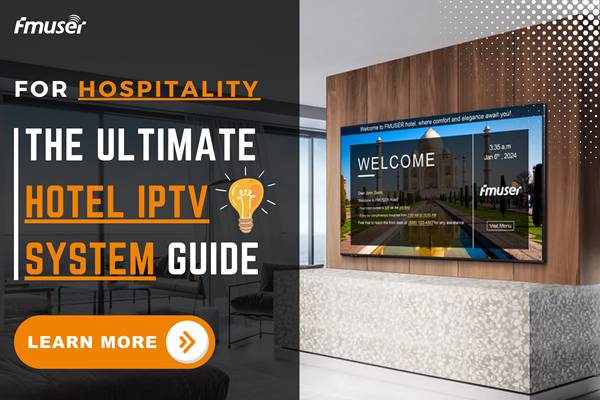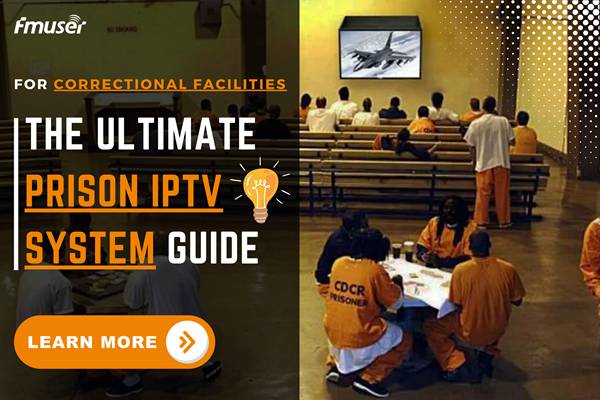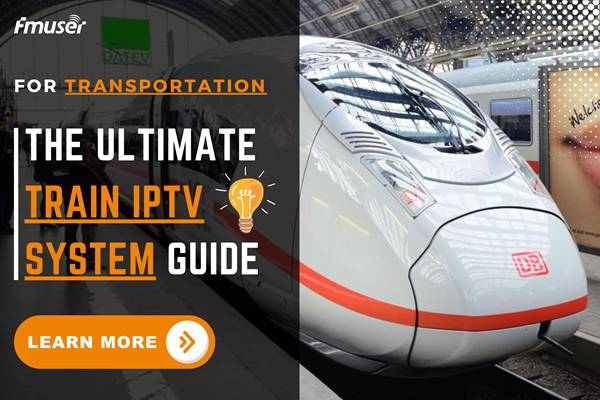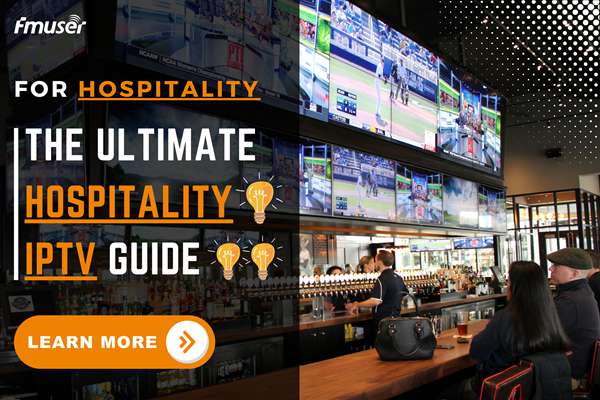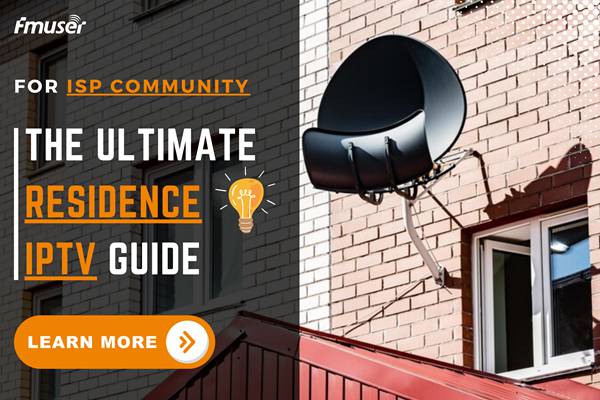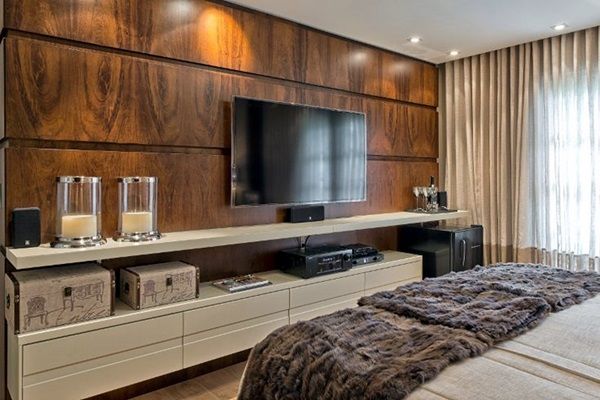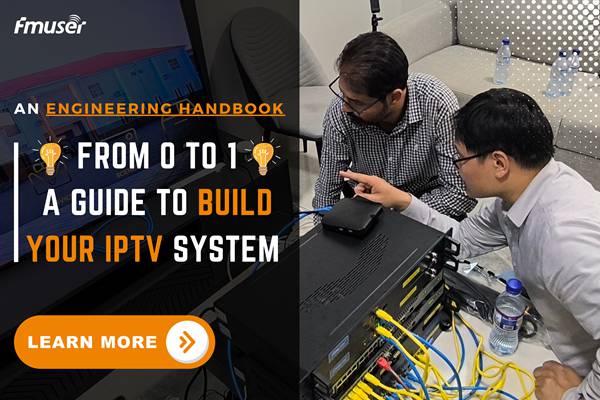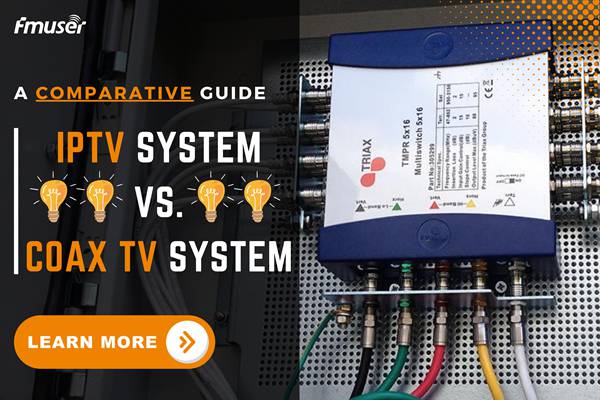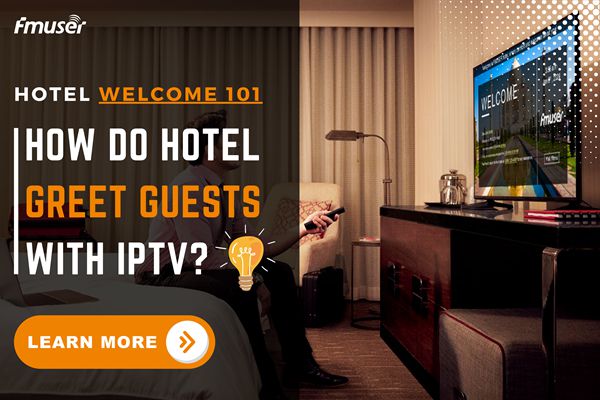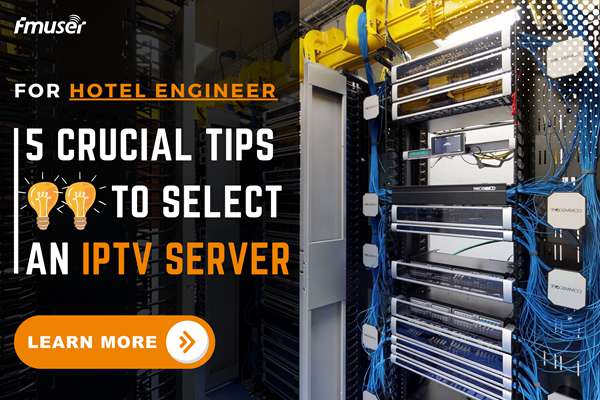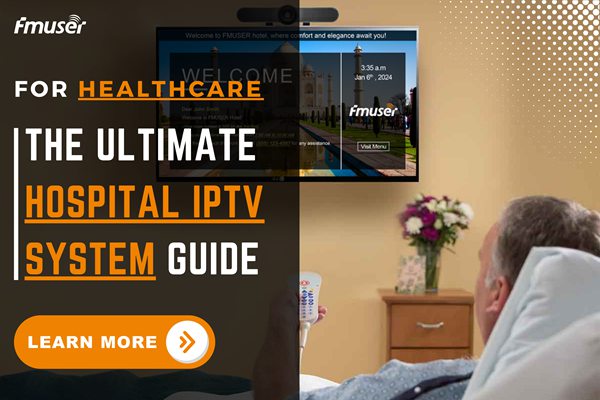
Hot tag
Popular search
IPTV Equipment: A Must-have List for Hotel & Resorts | FMUSER
Cable TV systems are outdated, no doubt; hotels are suffering from a constant pricey subscription fee per room monthly, while guests are still complaining about wasting time waiting for live sports games to load—not to mention the full screen of white noise playing intermittently.

In the past, even top hotels—those with five stars or more—used cable TV technology, and obviously, guests are complaining a lot. This is not good for brand image and the guest experience.
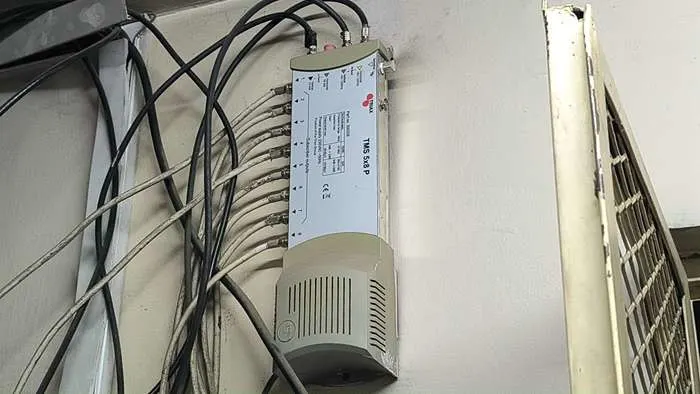 |
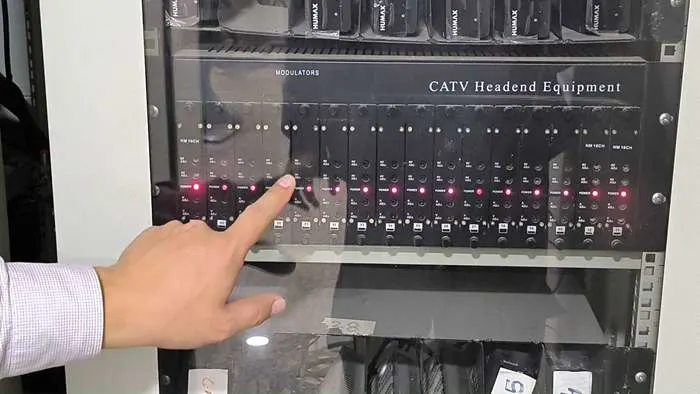 |
At the same time, the cable TV systems installed throughout the walls have served for several years and are rapidly aging. Costs are increasing—from maintenance fees to complaint management fees.
It's time to get rid of cable TV systems, but how? Or rather, is there an alternative?
Of course there is... and the name is IPTV system. This system is more feature-rich than cable TV, introducing interactive functions: HD live TV, VOD, hotel introductions, and everything you can imagine. You can see it as the next-generation TV technology, while cable TV represents the previous decade.
At the heart of the hotel IPTV system lies a series of IPTV headend equipment, similar to coax headend equipment but totally different.
In this blog, I will introduce you to a complete list of IPTV headend equipment, detailing each piece of this IPTV equipment, including what they are, how they work, and how to choose them wisely. This can help mitigate the risk of being misled by overzealous installers or vendors.
Having a full understanding of this IPTV equipment is just the start of exploring the IPTV world, no matter if you are a hotelier, system integrator, IT solution company, or any other decision-maker in hospitality.
Carefully read and follow us if you find this helpful.
Keep exploring!
Cable TV vs. IPTV
As IPTV continues to gain traction as a cutting-edge technology for content delivery, many people find it challenging to distinguish it from traditional television and cable TV.
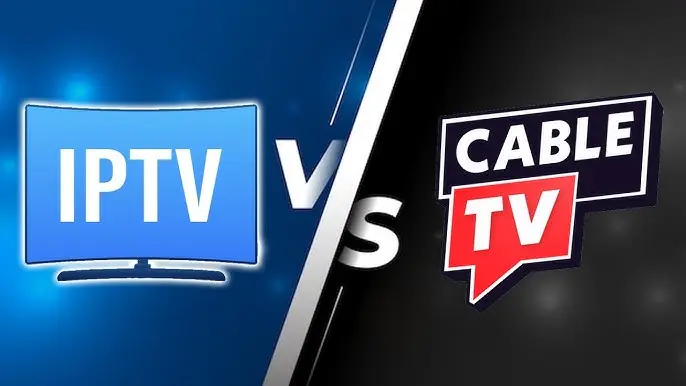
The terms can be confusing, especially since the term "TV" can refer to both IPTV and coaxial systems, either as a broad categorization of television systems or simply as a type of television set. Understanding these differences is essential for making informed choices about in-room entertainment systems.
1. What is a Coax TV System (Traditional Cable TV)
Coax TV, also known as cable TV or analog TV, refers to traditional television systems that deliver content over coaxial cables. This includes cable television services that transmit signals directly to the user's television set.
A coaxial TV system includes typical equipment such as:
- Headend Server
- Modulators
- Encoders
- Decoders
- Multiplexers
- Routers/Switches
- Distribution Amplifiers
2. What is IPTV Equipment or IPTV Headend?
When referring to IPTV, it can either be a concept of digital TV broadcasting protocol, or equipment—known as IPTV equipment or IPTV headend equipment.
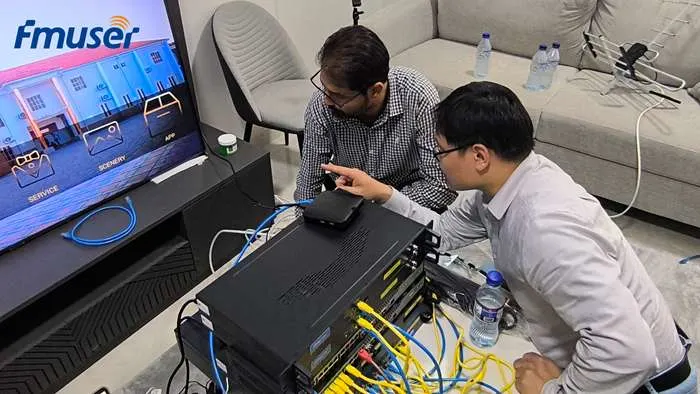
The terminology surrounding IPTV equipment can vary, with several alternative names often used interchangeably, including:
- IPTV headend
- IPTV server hardware
- IPTV equipment
- IPTV headend equipment
- Headend IPTV
- IPTV headend server
- IPTV head end
- IPTV headend system
- IPTV headend setup
Based on different suppliers, an IPTV system could be an independent system that relies on traditional satellite or cable signals, which is an upgrade from a coax TV system, using headend equipment that relies on almost no internet. It can also be a cloud-based IPTV system, which relies on robust internet, integrated into bundled smart TVs, using IPTV middleware. Typical providers are LG, Samsung, Sony, etc.
You May Like: The Ultimate Guide to IPTV Systems for Hotels
Most IPTV systems are primarily cloud-based, which requires a strong network infrastructure. Without web access, such systems cannot function effectively.
In contrast, a LAN-based IPTV system such FMUSER hotel IPTV System, operates over a local area network rather than relying on cloud infrastructure. Consequently, these systems do not require an internet connection to function, making them ideal for environments where reliable internet access may be limited or inconsistent.
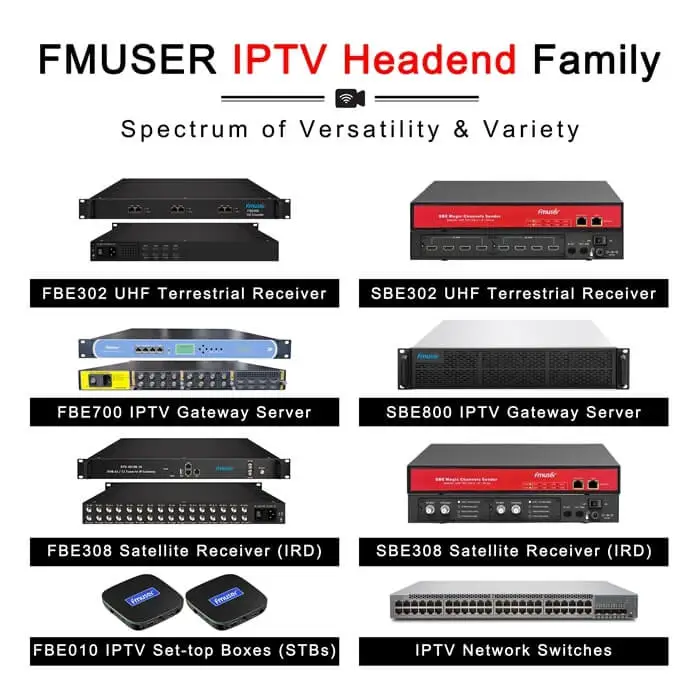
To avoid any misunderstanding, we'll discuss the independent IPTV system in this blog.
A LAN-based hotel IPTV system usually includes hardware and software components; several typical IPTV headend equipment options will be used:
- FMUSER FBE700 Hotel IPTV Hardware Server (IPTV Gateway)
- FMUSER FBE308 Free-to-Air (FTA) / CAM Tuner IRD
- FMUSER SBE302 UHF Receiver
- FMUSER FBE208 Hardware IPTV Encoder
- FMUSER Gigabit Network Switches & CAT6 Cables
In addition to the core components, several supplementary items are vital for a complete IPTV setup, including:
- FMUSER FBE010 IPTV Set-Top Box
- FMUSER Satellite Finder
- FMUSER Satellite System (Satellite Dishes and LNB)
- FMUSER UHF Yagi Antenna
- FMUSER Smart TV Sets
- FMUSER IT Room Server Rack
- FMUSER Digital IPTV Signage
These IPTV headend equipment components work together in processing and configuring a wide range of interactive content in the following process: "Content Provider >> Hotel IT Room >> Hotel Guest Room TV."
3. Comparison Chart
| Feature | Cable TV System | Hotel IPTV Solution |
|---|---|---|
| Images | 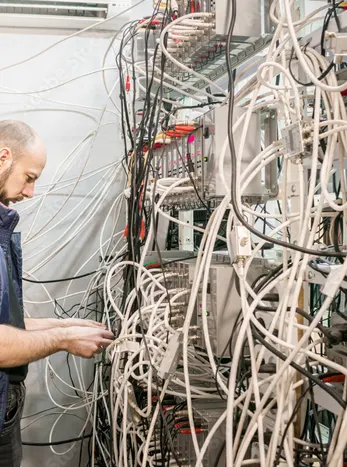 |
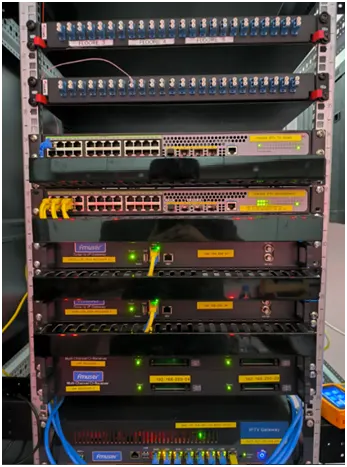 |
| Interactivity | Limited; only channel switching | Enhanced; includes VOD, hotel info, dining/shopping, music channels, scrolling text, etc. |
| Cabling Costs | High; coaxial cable required | Lower; can share CAT6 network cables with other systems |
| Multi-Service Operation | Restricted; limited bandwidth for HD or multiple streams | Supports; simultaneous viewing of multiple HD channels & other interactive functions |
| Encryption & Access Control | Limited; via CA cards | Advanced; multi-layered user management via web interface, better content protection |
| Image Quality | Standard; mainly SD | High; including HD and UHD options |
| Sound Quality | Basic; can enhance with external audio equipment | Superior; Dolby & surround sound support |
| Signal Stability | Vulnerable; prone to interference & snow/pixelation | Stable; reliable signal |
| Portability | Non-existent; fixed installation area | Versatile; accessible on multiple devices for mobile viewing |
| Bandwidth Requirements | Low; SD requires few Mbps | Higher; especially for HD & rich content |
| Flexibility | Low; fixed channel lineup | High; customizable programs & personalized recommendations |
| Technological Development | Mature; widespread adoption | Evolving; continuous upgrades for enhanced content & features |
| User Experience | Basic; limited functionality | Enhanced; multiple interactive features & personalized experience |
#1: FBE700 IPTV Hardware Server
An IPTV hardware server, or IPTV gateway server such as FMUSER FBE700, receives various types of media content—such as live TV broadcasts (from satellite, UHF or HDMI), on-demand videos, and recorded shows—and encodes or transcodes this content into IP formats suitable for streaming. It then manages the distribution of this content to end devices, such as set-top boxes or smart TVs, enabling hotel guests to access their desired TV content with minimal lag or buffering.
FMUSER FBE700 All-in-one IPTV Gateway Server.
👇 >>See More 👇
So far, most hotel IPTV solution suppliers are using separate IPTV equipment to help hotels build their IPTV systems. Such solutions may be stable but are costly at the same time, which is not friendly to those small hotels with few rooms. That’s why FMUSER has released an affordable IPTV solution with the FMUSER FBE700 IPTV gateway server. It allows for a simplified rack space design that eliminates more hardware costs than before. Most importantly, the input boards can be selected from the six most common input methods for a hotel, which are:
- HDMI/SDI codec board
- UHF Terrestrial Input Board
- CAM Card Input Board
- IPTV Network Input Board
- FTA Input Board
- Coaxial Cable Output Board (DVB-T/T2, ISDB-T, and ATSC)
👇 Learn more details of FMUSER FBE700 via the following intro video 👇
1) IPTV Management Software Integration
IPTV Management Software serves as the backbone of a hotel IPTV system, providing essential tools to manage, monitor, and distribute content effectively. This software handles various operational aspects, including content scheduling, user management, analytics, and system monitoring.
👇 Why Hotel Needs IPTV: Features & Functions Explained 👇
By connecting all components of the IPTV system—such as servers, encoders, and set-top boxes—it ensures smooth content flow from source to end-user. Additionally, it facilitates communication between devices and allows for real-time updates, enabling service providers to respond quickly to user demands and optimize system performance metrics.
- Content Management: This function allows operators to upload, categorize, and manage video content, including Video on Demand (VOD) and live broadcasts. Operators can create schedules for content availability and update libraries easily.
- User Management: IPTV management software helps track user subscriptions, authenticate users, and manage access to different content levels. This includes creating user profiles and handling billing and account settings.
- PMS Compatibility: Integrating IPTV management software with a hotel's Property Management System (PMS) is essential for smooth operations. Compatibility ensures that features like personalized content and streamlined billing are efficiently managed. This integration enhances the guest experience by allowing hotel staff to control in-room entertainment easily, ultimately improving service delivery and satisfaction.
- Analytics and Reporting: IPTV management software often includes tools for gathering and analyzing viewer data. Operators can track viewership statistics, monitor system performance, and gather insights on user behavior to improve service offerings.
- Integration with Other Systems: IPTV management software can often integrate with third-party systems, such as billing platforms, customer relationship management (CRM) systems, and advertising networks, providing a comprehensive solution for service operators.
2) Welcome Messages Management
Welcome messages are a good way to improve hotel guests’ stay-in experience.
Hotel guests need to be treated differently, especially for some VIP hotel guests; they value the stay-in experience to make them feel treated uniquely, and IPTV can make this happen while cable TV systems cannot.
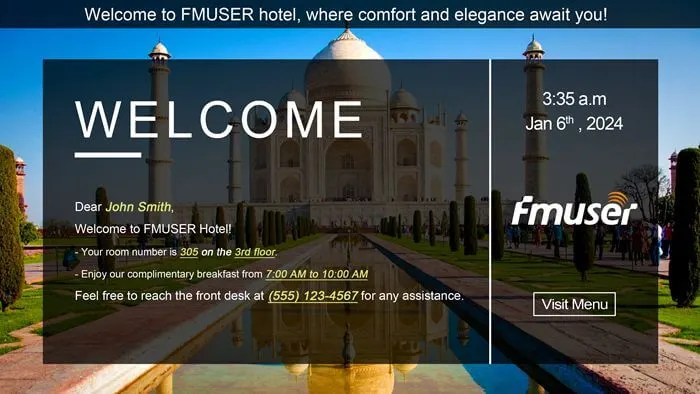
After turning on the TV sets, the guests may first see a welcome message displayed on the TV, written with their names as below:
"Dear John Smith,
Welcome to FMUSER Hotel!
- Your room number is 305 on the 3rd floor.
- Enjoy our complimentary breakfast from 7:00 AM to 10:00 AM.
Feel free to reach the front desk at (555) 123-4567 for any assistance."
The welcome message function is controlled by the software installed in the FBE700 IPTV hardware server. Operators, such as hotel front desk staff, can easily customize the entire message after guests check in, from guests’ names to message templates.
3) Live TV Channel Management
IPTV hardware server lies in the central position of the entire IPTV system, bridging the content from content providers through network cables connected from:
- The satellite receiver (IRD) for FTA/CAM live TV content in RF format to receive the satellite dish into IP
- The UHF receiver for processing terrestrial TV content received by a UHF yagi antenna in RF to IP
- The IPTV hardware encoder for HDMI/SDI content (usually homebrew locally) into IP.
All this live broadcast content is converted into IP and delivered seamlessly over a local area network (LAN) to guest room IPTV set-top boxes through network cables and displayed on TVs.
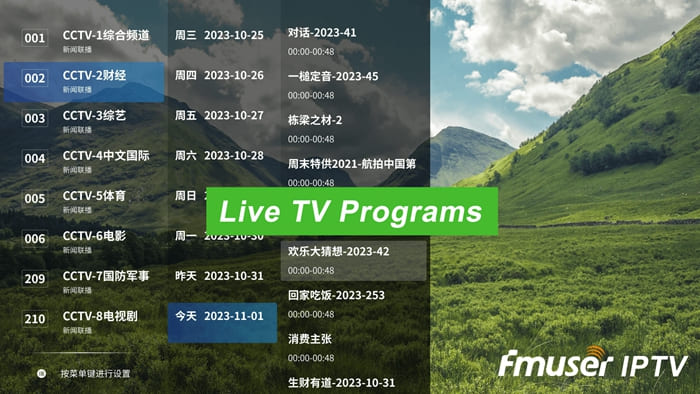
The advent of the FMUSER FBE700 IPTV gateway server integrates the latest IPTV technology and eliminates the need for additional rack equipment, such as satellite receivers and UHF receivers. Instead, it allows for input board customization, which lowers the overall cost while maintaining the original functions of the aforementioned rack equipment.
👇 How to Install a Hotel IPTV System: A Complete Guide 👇
Besides the live TV content, an IPTV hardware server is also responsible for managing various types of media content for the guests. When speaking of an interactive TV system for a hotel, it actually means the interactivity between the hotel guests in the guest room and the IPTV hardware server in the IT room.
4) Digital Hotel F&B Management
Nice Food and Beverage (F&B) offerings always attract hotel guests. By the way, this is a battlefield and one of the most important selling points, alongside bed services, for hotels.
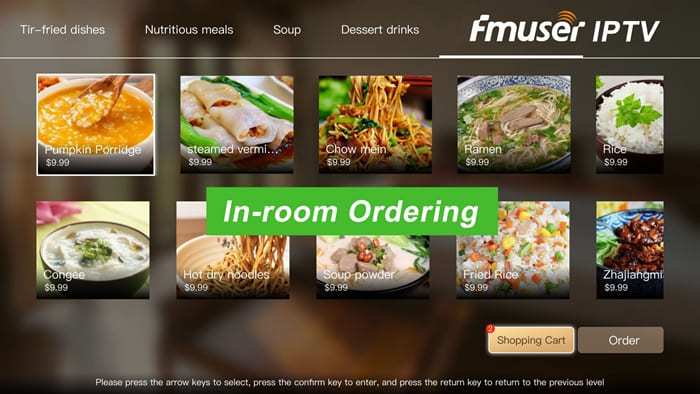
In the past, hotel guests who were either not convenient, unavailable, or simply didn't want to be bothered, or wished to enjoy their dining time in their rooms, needed to order food and drinks by calling the front desk or leaving a paper with their food needs written on it, which was then handed over to the front desk by any means.
We know that front desks are busy all day long; under such situations, a call might be missed, or a paper might easily get lost. This can lead to poor service for guests and complaints on social media and booking apps, which is detrimental to your hotel’s rating.
How about going for a digitalized F&B menu via TV? Sounds great!
An IPTV headend server provides such functionality. By working with IPTV set-top boxes (with dedicated APKs installed), hotel guests can use a remote control to order food and drinks via TV sets. This system is entirely paperless and call-less. The requirements are sent through the network cable connected to the set-top boxes and to the IPTV headend server.
A reminder bell will notify the management software installed in the IPTV headend server. The operators (usually hotel front desk staff) will be alerted and can respond in a timely manner, sending the order to the hotel kitchen and notifying hotel service staff for room-to-room delivery once the food/drinks are ready. The order will then be closed in the management system automatically, with the added costs for the food/drink order after guests check out.
As the entire F&B menu goes digitalized, images or videos of food items can be uploaded. Classifications can be set up, and descriptions, titles, and prices can be customized. Most importantly, based on guest levels, a customized F&B digital menu can be created for VIPs. Recommendations can be tailored to improve hotel revenue. Meanwhile, as the menu goes digital, hotel services are simplified and recorded. The IPTV headend server provides the opportunity to collaborate and streamline workflows between the front desk, hotel kitchen department, and guest service department, making it more efficient in service and hotel management.
5) Digital Video-On-Demand (VOD) Management
Gone are the days when hotel guests had limited viewing options or had to rely on DVD rentals and pay-per-view services. The rise of Video-On-Demand (VOD) has transformed the landscape of in-room entertainment. Imagine guests being able to select from an extensive library of movies and shows at their fingertips—this is where an IPTV headend server comes into play.
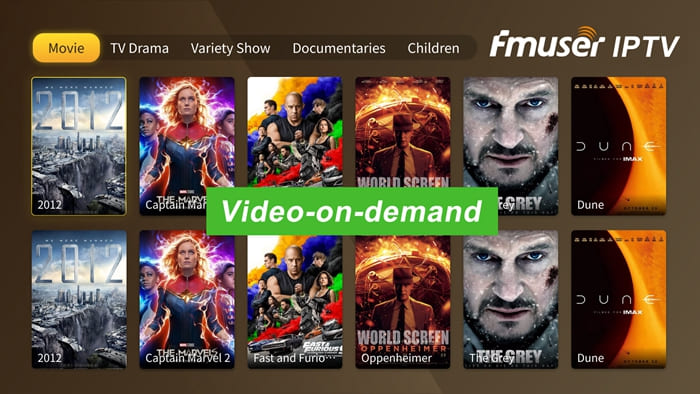
An IPTV headend server is at the heart of this innovative system, empowering hotels to deliver a seamless VOD experience. By integrating with IPTV set-top boxes, this technology allows guests to access a vast array of on-demand content directly through their television screens. No more flipping through channels or waiting for scheduled programming; guests can browse, select, and enjoy their favorite films and shows whenever they desire.
The operation is simple yet effective. With a user-friendly interface accessible via the remote control, guests can explore categories, view trailers, and even rate their selections. Once a choice is made, the requests are relayed through the network to the IPTV headend server, where the content is securely delivered. This digital approach not only enhances guest convenience but also reduces the workload of hotel staff, allowing them to focus on delivering exceptional service.
Moreover, the IPTV headend server can track viewing preferences, enabling hotels to gather valuable insights into guests’ tastes and habits. This data can be utilized to tailor personalized recommendations, enhancing the guest experience and potentially boosting revenue through targeted promotions. The management system also allows hotels to maintain control over licensing agreements and content availability, ensuring compliance and minimizing costs.
6) Hotel Facilities & Scenic Spot Introductions
In the competitive landscape of hospitality, providing guests with rich information about hotel facilities and nearby scenic spots is crucial. Guests today expect seamless access to information that enhances their stay, making it essential for hotels to leverage technology effectively.

Traditionally, guests seeking information about on-site amenities or local attractions would rely on printed brochures, verbal instructions from staff, or even outdated digital displays scattered throughout the property. This approach often resulted in a fragmented experience, with guests missing out on valuable insights and recommendations that could elevate their stay.
Enter the IPTV headend server—a game-changer in guest communication and information dissemination. By integrating with IPTV set-top boxes equipped with user-friendly applications, hotels can deliver a comprehensive guide to their facilities and local attractions directly to guests through their in-room TVs.
Imagine a scenario where a guest, after enjoying a day of exploration, returns to their room and wants to discover more about the hotel's amenities or nearby scenic spots. With just a few clicks on the remote control, they can access an interactive digital guide that showcases everything from the rooftop pool and spa services to popular hiking trails and local dining spots. This system eliminates the need for paper handouts or lengthy phone calls to the front desk, providing guests with instant access to the information they desire.
The IPTV headend server not only facilitates this information flow but also allows for dynamic content updates. Hotels can easily refresh details about special events, seasonal attractions, or promotional packages, ensuring that guests are always in the loop. Moreover, the digital platform can feature high-quality images and engaging videos, making the experience visually appealing and informative.
This functionality not only enhances guest satisfaction but also streamlines hotel operations. With real-time analytics, management can track which facilities or attractions are garnering the most interest, enabling them to tailor offerings and improve services accordingly. This data-driven approach can lead to increased revenue through upselling opportunities, as guests are more likely to explore and take advantage of highlighted amenities and local experiences.
#2: FBE308 Free-to-Air (FTA) / CAM Tuner IRD
1. What is a Free-to-Air/CAM Tuner IRD and How It Works
When referring to a tuner IRD, you may think of a small box used in your house for decoding TV channels. From a personal perspective, yes, it is; a tuner IRD is indeed a small box, just like a set-top box.
However, in a commercial situation, such as in a hotel room, a tuner IRD is more like rack equipment. This equipment is generally used to receive and process multiple TV contents that have tens of frequencies directly from a satellite dish and LNB, converting these RF signals into IP streams for the IPTV hardware server.
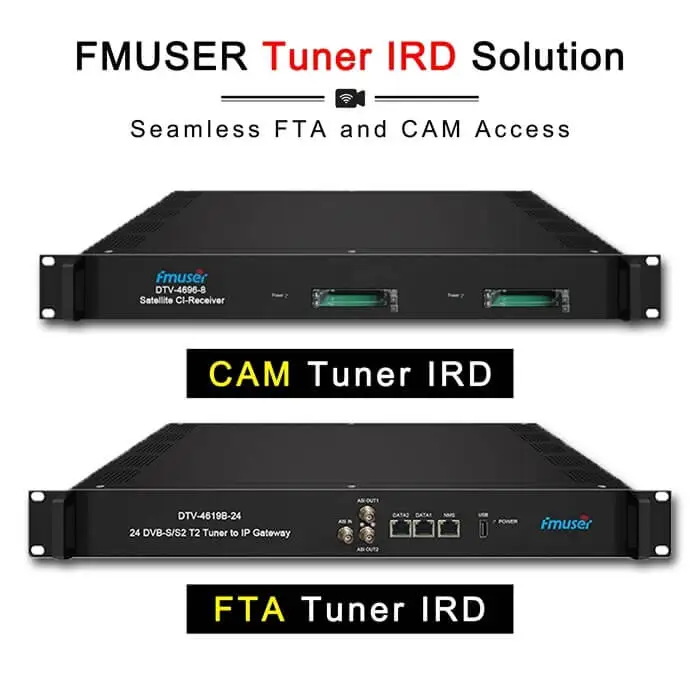
Based on specifications, a tuner IRD can either be:
- Free-to-Air (FTA) Tuner IRD: Specifically designed for free-to-air TV channels, this type generally has multiple input ports on the back panel. FTA tuner IRDs are commonly seen and highly compatible in most hotels.
- CAM Tuner IRD: Designed with 2 or 4 slots for CAMs, with inserted CAMs, encrypted TV channels that require subscriptions can be unlocked based on the subscription model (yearly or monthly). CAM tuner IRDs are not commonly seen since the content source is fully controlled by content providers such as DStv in Africa.
A commercial tuner IRD works closely with the IPTV hardware server and satellite dish system. It depends on your requirements regarding the numbers and types of TV channels; the specifications can vary. Additionally, it may require a larger caliber satellite dish or a different LNB with different specifications, such as a quad LNB (4 ports) or an 8-way LNB. The tuner IRD is important for configuring live TV channels in a hotel IPTV system. Please remember that.
2. Main Functions of Free-to-Air/CAM Tuner IRD
- Signal Reception: The IRD receives broadcast signals from various sources, including satellites and terrestrial antennas, facilitating a wide range of content options for IPTV users.
- Decoding and Decrypting: It decodes the incoming digital signals, converting them into a suitable format for viewing. If the content is encrypted, the CAM module allows for the decryption of these signals, enabling access to premium channels as needed.
- Outputting Streams: Once the signals are decoded, the IRD outputs the processed streams to the IPTV hardware server or directly to set-top boxes, making the content available to end-users.
- Integration with Middleware: The IRD works closely with middleware systems to facilitate user authentication, channel management, and program guide functionalities, ensuring a cohesive viewing experience.
- Multimedia Management: Many IRDs also provide features for managing multiple video streams, allowing for simultaneous viewing of different channels without compromising quality.
#3: SBE302 UHF Receiver
1. What is a UHF Receiver and How It Works
A UHF (Ultra High Frequency) Receiver is a crucial component in an IPTV system, designed to receive broadcast signals over UHF frequencies, which typically range from 300 MHz to 3 GHz. These frequencies are essential for capturing over-the-air channels that may not be accessible through traditional cable or satellite services, particularly for terrestrial television broadcasts.
In a hotel IPTV system, the UHF receiver works in conjunction with a UHF Yagi antenna connected via coaxial cable, effectively picking up UHF signals transmitted by local broadcast stations. Once the signals are acquired, the receiver decodes these broadcasts and converts them into IP format for the IPTV hardware server, allowing integration into the IPTV system.
2. Main Functions of UHF Receivers
- Signal Reception: The UHF receiver captures broadcast signals from local television stations. This is particularly important in areas where cable or satellite options are limited or for users seeking additional viewing choices.
- Decoding: After receiving the signals, the UHF receiver decodes the transmitted video and audio data. This process converts the signals into a digital format that can be processed by the IPTV system.
- Integration with IPTV Systems: The decoded signals are forwarded to the IPTV hardware server or directly to set-top boxes, allowing users to access live broadcasts along with other on-demand content available on the IPTV network.
- Channel Management: UHF receivers often include functionalities for scanning and managing available channels, ensuring that users can easily navigate between various broadcast options.
- Enhanced Signal Quality: Many UHF receivers are equipped with advanced technology to improve signal quality and reduce interference, providing a clearer and more stable viewing experience.
#4: FBE208 Hardware IPTV Encoder
1. What is a Hardware IPTV Encoder and How It Works
A Hardware IPTV Encoder is a specialized device in an IPTV system that converts local audio and video content from its raw formats (e.g., MP3/MP4) into IP format for transmission to the IPTV hardware server.
It takes input from various sources such as cameras, video files, or live feeds, and encodes this content into compressed digital formats using specific codecs like H.264 or H.265. Once encoded, the video is packaged into IP streams, enabling hotel guests to access content via set-top boxes and integrated Live TV channels on their TVs.
2. Main Functions of Hardware IPTV Encoders
- Video Compression: The primary role of the encoder is to compress video files to reduce their size while maintaining acceptable quality. This is vital for efficient bandwidth usage and quicker transmission over IP networks.
- Format Conversion: Encoders convert video content into various formats compatible with different devices and streaming protocols. This ensures that viewers can access the content regardless of the device they use.
- Multi-Stream Capability: Many hardware encoders can simultaneously encode multiple streams, allowing for the simultaneous delivery of live broadcasts and on-demand content to multiple viewers.
- Real-Time Streaming: Hardware IPTV encoders are designed for real-time encoding, making them suitable for live broadcasts. They process and deliver content with minimal latency, which is critical for live events.
- Integration with Middleware: Encoders often work in conjunction with middleware platforms to manage content distribution, user authentication, and provide features like Electronic Program Guides (EPGs).
#5: Gigabit Network Switches & CAT6 Cables
1. What is a Gigabit Network Switch and How It Works
In a hotel IPTV system, a gigabit switch plays a vital role in managing and routing data packets efficiently across the network. Given that each TV channel requires approximately 2 Mbps, and considering a scenario where all 300 guest rooms are watching TV simultaneously, a total bandwidth of 600 Mbps is essential to ensure a smooth viewing experience. To meet this demand, a high-capacity Gigabit Ethernet Switch is necessary not only in the hotel's IT room but also strategically placed on each floor of the building. This setup enables optimal distribution of bandwidth and minimizes latency, ensuring that all guests can access their desired channels without interruptions.

However, the number of ports available on a single network switch can be limited, making it impractical to connect all rooms directly. Therefore, installing additional switches on each floor helps extend the network reach and manage connections more effectively. Alongside these switches, CAT6 cables are crucial for facilitating high-speed data transmission. Rated for speeds up to 1 Gbps, CAT6 cables support the bandwidth requirements of modern IPTV systems while minimizing interference and signal degradation. This combination of Rack Mount Gigabit Ethernet Switches and CAT6 cables ensures a robust and reliable infrastructure that can handle the demands of a full hotel occupancy, providing guests with uninterrupted access to their favorite TV channels.
2. Main Functions of Network Switches
- Data Packet Forwarding: Switches receive incoming data packets and forward them to the appropriate destination device based on MAC addresses, ensuring efficient communication across the network.
- Bandwidth Management: Network switches manage bandwidth allocation among connected devices, preventing bottlenecks and ensuring that data-intensive applications, like video streaming, function smoothly.
- Multicast Support: Many IPTV systems rely on multicast protocols to transmit video streams to multiple users simultaneously. Network switches facilitate this by efficiently distributing multicast traffic to all relevant devices, reducing network congestion.
- Traffic Segmentation: Switches can segment network traffic into separate virtual LANs (VLANs), which helps isolate network segments for improved performance and security. This is especially useful for managing different types of traffic within an IPTV system.
- Network Monitoring and Management: Advanced network switches often include features for monitoring network performance, analyzing traffic patterns, and diagnosing issues, allowing for proactive management of the IPTV infrastructure.
#7: Necessary IPTV-related Equipment
In an IPTV system, several additional components work together to ensure a comprehensive and effective setup. This section covers the necessary equipment, including: IPTV set-top box, satellite finder, satellite dishes and LNB (Low-Noise Block Downconverter), UHF Yagi antenna, TV sets, a big rack, and digital signage.
1. FMUSER FBE010 IPTV Set-Top Box
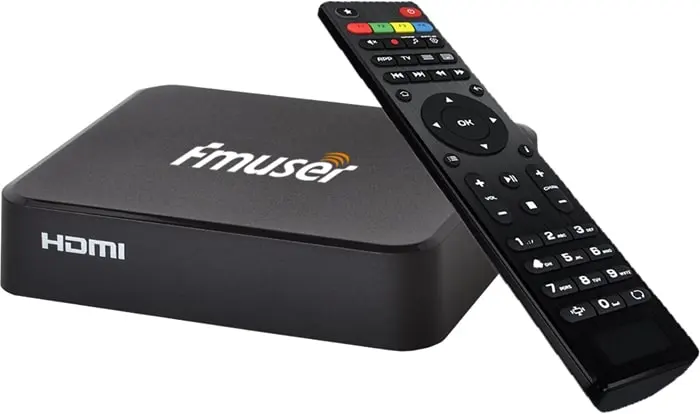 |
As a LAN-based TV system, FMUSER's hotel IPTV system requires that everything in the hotel guest's room be equipped with a FBE010 set-top box (STB) that is installed with a compatible APK, allowing hotel guests to interact with the IPTV system. This interaction includes seamless access to a range of live TV channels, video-on-demand (VOD) services, food and beverage in-room ordering, and callless hotel services, among others. The system connects with the IPTV equipment installed in the hotel's IT room using network cables and to the smart TV via the set-top boxes. Each set-top box comes with a bundled TV remote designed with advanced aesthetics, featuring functional buttons and an ergonomic handhold.
The FBE010 STB provides a user-friendly interface that facilitates navigation through channels and content libraries, enhancing the viewing experience and guest interactivity with hotel management. Hotel guests interact with the STB, and the software management system integrated with the FBE700 IPTV headend server will be notified and process orders to different hotel departments until the order is fulfilled.
When selecting an STB, it is essential to consider compatibility with required codecs and streaming protocols, the quality of the user interface, and processing power to support HD or 4K streaming capabilities.
In most cases, the STBs are bundled with the system, making it unnecessary to choose independently. |
2. FMUSER Satellite Finder
|
A Satellite Finder is an essential tool for aligning satellite dishes to receive optimal signals from satellites. By measuring the strength of the received signals, it assists technicians in precisely positioning the dish for maximum signal quality.
This device simplifies the installation process, ensuring that users can access satellite broadcasts without interruption.
When choosing a satellite finder, factors such as sensitivity to weak signals, ease of use, and compatibility with the frequency range of the satellite setup should be evaluated to ensure reliable performance. |
3. FMUSER Satellite Dishes and LNB (Low-Noise Block Downconverter)
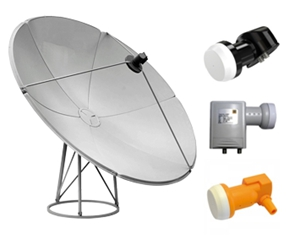 |
Satellite dishes are parabolic antennas designed to capture signals transmitted from satellites, while the Low-Noise Block Downconverter (LNB) is mounted on the dish to convert high-frequency signals into lower frequencies suitable for the receiver. Every satellite installer knows this.
That's why in the FMUSER hotel IPTV solution, we offer two options: you can buy the satellite yourself, or we can choose the satellite for you. Based on the size and number of hotel guest rooms, we can select the best satellite system for you, including the dishes, cables, and LNB. When installing our IPTV system, a compatible satellite system is important because a large supplier may have a long delivery time, and once serviced, it may be postponed, leaving other tasks incomplete until the entire project—including the IPTV system—is initialized for the hotel. When the day comes, you may find that the satellite equipment is incompatible with our IPTV system, from the sizes, positions, brands, and materials of the dish to the types of LNB (single, twin, quad).
How will you handle this significant problem if it is not compatible? Therefore, it is crucial to choose the satellite wisely. Think twice before making a decision, or turn to our IPTV experts for assistance. |
4. FMUSER UHF Yagi Antenna
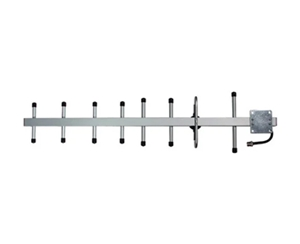 |
The FMUSER UHF Yagi Antenna is a superior, highly directional antenna specifically engineered to enhance the reception of UHF television signals. This makes it an exceptional choice for anyone looking to improve their television viewing experience through over-the-air broadcasts.
One of the standout features of the FMUSER UHF Yagi Antenna is its multi-element design, which effectively captures signals from a designated direction. By focusing on specific signal sources, this design minimizes interference from other sources, ensuring a clearer and more reliable signal for viewers.
With its ability to enhance reception quality, the FMUSER UHF Yagi Antenna truly transforms your television viewing experience. Its high gain directly impacts performance, allowing for better reception of UHF signals and significantly improving clarity. Furthermore, this antenna is constructed with durable, high-quality materials that can withstand various weather conditions, ensuring long-lasting use. To top it off, the antenna offers versatile mounting options, allowing for optimal positioning that maximizes performance in any setup. |
5. FMUSER Smart TV Sets
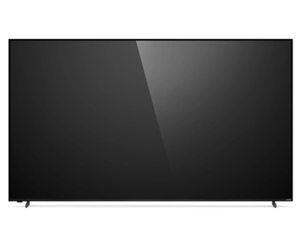 |
TV sets serve as the end-user display devices that receive and showcase content from the IPTV system. They render video and audio signals for viewers, and many modern TVs offer smart features that allow direct access to applications and additional content sources.
To integrate with a hotel IPTV system, you need to be careful about the TV brands and their software versions (Android or others). While LG, Samsung, and similar TV suppliers integrate their own IPTV systems, these solutions are typically cloud-based. You will need a strong network infrastructure for that, and you may experience limited customization in functions and integration of your hotel’s style information. Additionally, the after-sales services might not be thorough or patient.
Sometimes, it is not easy for small hotels to choose TV sets and an IPTV system at the same time. FMUSER has strategically partnered with AMAZ, a well-known TV supplier specializing in affordable TV sets, to integrate with the FMUSER hotel IPTV system. This partnership provides similar functions to those offered by larger brands at lower costs. We offer customization options to fit into your hotel style and brand values, all aimed at enhancing the guest stay experience via IPTV.
We provide smart TV sizes ranging from 24 inches to 98 inches, all borderless, covering HD, 4K, or even higher resolutions, and fully compatible with the FMUSER hotel IPTV system. HDMI and USB ports are supported. Learn more >> |
6. FMUSER IT Room Server Rack
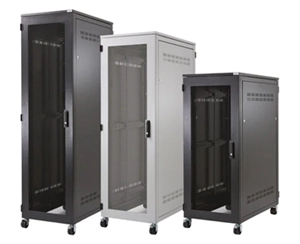 |
An IT room server rack is important—not that important as the rack equipment inside, but still more important than you can imagine. Heat dissipation, stability, cable management, and size are all critical factors. Do not overlook the importance of a server rack. During the installation of the FMUSER hotel IPTV system, a good rack with a reasonable design helps FMUSER engineers proceed with the project even faster and ensures proper cooling and airflow to prevent overheating.
Most importantly, a large rack ensures enough space for each piece of FMUSER hotel IPTV equipment and additional equipment, such as fiber switches, routers, and more. When there are equipment upgrades in the future, such as transitioning from a cable TV system to an IPTV system, there is enough space available and durability to support the weight of the hardware.
A well-designed rack can also enhance the overall aesthetic of the technical environment by housing and organizing various hardware components. |
7. FMUSER Digital Signage
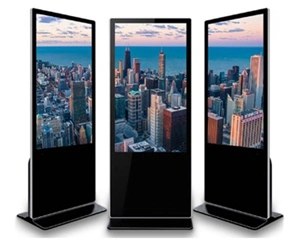 |
FMUSER Digital Signage is an ideal addition to our comprehensive hotel IPTV solution.
One of the key advantages of integrating digital signage within an IPTV context is its ability to effectively inform guests about available IPTV channels, schedules, and special offers. By capturing their attention in a visually appealing manner, digital signage significantly enhances guest engagement and overall satisfaction.
Moreover, FMUSER provides digital signage options in various sizes and resolutions, ensuring compatibility with our hotel IPTV solution. This versatility allows hotels to choose the most appropriate signage for their specific needs and settings. The digital signage solutions are designed for ease of setup and integration, making it simple for hotel staff to implement without requiring extensive technical expertise.
In terms of durability, FMUSER Digital Signage is built to withstand various environmental conditions. With robust weather resistance and strong construction, our signage is suitable for both indoor and outdoor applications, ensuring reliable performance that hotels can depend on. This combination of features makes FMUSER Digital Signage an excellent choice for enhancing the guest experience in any hotel environment. |
How to Choose Your IPTV Equipment
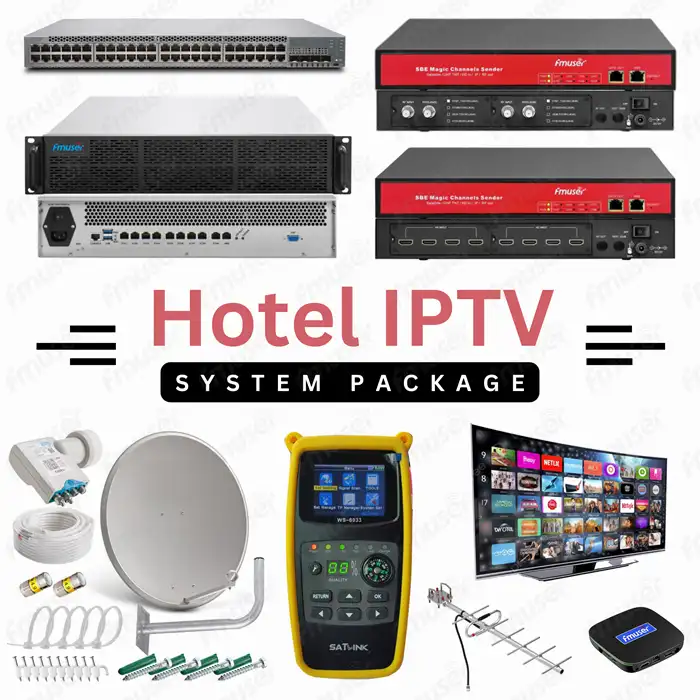
Selecting the right IPTV equipment can be a daunting task, especially with the myriad options available in the market. To help streamline your decision-making process, consider the following six perspectives:
1. Equipment List
- Compatibility: It is essential to choose equipment that is compatible with your existing infrastructure. Consider the type of signals you need to process, the type of networks carrying data to and from your facility, and other hardware systems supporting your IPTV delivery. You may also consider choosing equipment with open standards to ensure interoperability.
- Comprehensive Inventory: Start by acquiring a complete list of required equipment, which includes all headend components and supplementary devices. This should encompass everything from IPTV servers and encoders to set-top boxes and cables.
- Research and Comparison: Take the time to learn about different equipment options available in the market. Understanding the specifications, capabilities, and features will equip you to communicate effectively with your clients and persuade them of the necessity and benefits of implementing an IPTV system.
2. Customization
- Evaluate Customization Options: Assess the degree of customization available for both hardware and software from potential suppliers. A flexible IPTV solution allows for tailored features that can adapt to specific client needs, enhancing user experience and satisfaction.
- Future-Proofing: Consider suppliers that offer scalable solutions, ensuring that your IPTV system can grow and evolve with changing demands and technological advancements.
3. Environment Assessment
- Evaluate Your Existing Infrastructure: Consider your current infrastructure and how your IPTV system will integrate with it. Determine whether your existing system supports IPTV protocols and identify any potential issues.
- Budget Considerations: Determine your budget and the financial constraints of your clients. This will help in selecting equipment that offers the best value without compromising quality.
- Installation Context: Evaluate whether the IPTV system will be installed in a new or existing facility. Existing infrastructures may pose challenges such as cabling needs and compatibility with older technology.
- Project Urgency: Assess the urgency of the project, as this will influence delivery times and testing schedules from the supplier. If you're working under tight deadlines, it's crucial to communicate this with your chosen vendor.
- Balancing Roles: If you are a system integrator, maintain a collaborative balance between the IPTV equipment supplier and the project manager. Open communication is key to ensuring satisfaction and successful project completion.
- Mind your industry: When selecting an IPTV system, it is essential to consider the intended applications, as this may necessitate specific customizations in hardware or software. IPTV headend equipment finds extensive use across various industries, including hotels and resorts, healthcare, education, corporate enterprises, prisons, ship-based systems, government organizations, ISP buildings, hospitality venues, trains and railways, fitness centers, and more.
4. Know Your Role
- Clarify Responsibilities: Understanding your role within the project is fundamental. The responsibilities may differ between system integrators, hoteliers, front desk staff, and investors. Knowing your position will help you focus on your contributions and work effectively with other team members.
- Enhance Collaboration: By recognizing how your role fits into the larger picture, you can contribute to a more cohesive project execution, enhancing the likelihood of success.
5. Trusted Partners
- Supplier Evaluation: Conduct thorough research to compare different suppliers. While some well-known brands might boast extensive product ranges, they may lack the support or responsiveness you need. Conversely, lesser-known suppliers might offer competitive pricing and superior customer service.
- Familiarization with Products: Take the time to review product literature, watch informative videos, and explore case studies or solutions offered by potential suppliers. This foundational knowledge will strengthen your confidence in your choices.
- Building Trust: Once you select a supplier, extend your trust to them. Attempting to manage the project entirely on your own can lead to significant challenges, so rely on your partners’ expertise to guide you through the process.
IPTV Equipment Is Just the Beginning
In this blog, we introduced a full list of IPTV headend equipment you'll need to build up a complete hotel IPTV system from scratch.

Sometimes, it is important to keep an eye on beyond the IPTV equipment list, because even with these IPTV equipment, you may find it challenging in installation, configuration, or system integration.

That is why FMUSER is here to help. Our team of experts is dedicated to providing comprehensive support that goes beyond just delivering IPTV equipment. We offer a range of services including professional installation, system configuration, and ongoing technical support to ensure that our IPTV solution runs smoothly in your hotels from day one.
Download our hotel IPTV solution in PDF format to learn more details:
| Category |
Content | |
|---|---|---|
| FMUSER FBE700 All-In-One IPTV Gateway Server Introduction (EN) |
||
| FMUSER IPTV Solution for System Integrators (EN) |
||
| FMUSER Company Profile 2024 (EN) |
||
| FMUSER FBE800 IPTV System Demo - User Guide |
||
| FMUSER FBE800 IPTV Management System Explained (Multiligual) | English |
|
| Araic |
||
| Russian |
||
| French |
||
| Korean |
||
| Portuguese |
||
| Japanese |
||
| Spanish |
||
| Italian |
Download Now | |
Ready to elevate your hotel's entertainment experience? Contact FMUSER today to learn more about our cutting-edge IPTV solutions tailored for your needs.
Contents
Related Articles
CONTACT US


FMUSER INTERNATIONAL GROUP LIMITED.
We are always providing our customers with reliable products and considerate services.
If you would like to keep touch with us directly, please go to contact us

